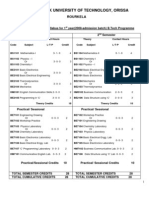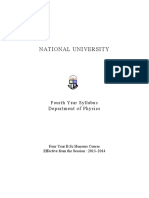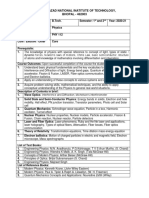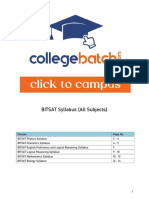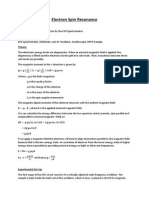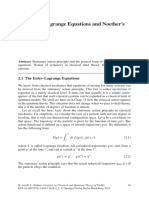SSP Syllabus
SSP Syllabus
Uploaded by
Haze Subin CCopyright:
Available Formats
SSP Syllabus
SSP Syllabus
Uploaded by
Haze Subin COriginal Title
Copyright
Available Formats
Share this document
Did you find this document useful?
Is this content inappropriate?
Copyright:
Available Formats
SSP Syllabus
SSP Syllabus
Uploaded by
Haze Subin CCopyright:
Available Formats
PHY6001 Introduction to Solid State Physics L T P J C
3 0 0 4 4
Syllabus Version
Course prerequisites None v.1.0
Course Objectives:
1. To Provide an introduction to some basic concepts in solid state Physics.
2. To understand crystal structure; lattice vibrations, electron interactions, Fermi surface and
models of electron dynamics.
3. To understand electron transport in metals semiconductors and super conductors.
Expected Course Outcomes: Students will be able to
1. Comprehend basic model of electron dynamics in metals
2. Analyze higher and advanced models of electron dynamics in metals
3. Learn basic concepts of crystal structure and lattice arrangements
4. Recall lattice dynamics electron and lattice interactions
5. Explain basic electron mobility in a crystal structure
6. Apply semi classical picture of electrons in a crystal structure and its outcomes
7. Analyze electron dynamics in a semiconductors
8. Demonstrate electron dynamics in superconductors
Student Learning 2,7,9
Outcomes: (SLO)
Module:1 Drude Model of Metals 5 hours
DC & AC Electrical Conductivity, Hall Effect and Magneto resistance, Thermal Conductivity,
Thermal Electric Effect
Module:2 Sommerfeld Theory of Metals 5 hours
Fermi Statistics and Fermi Surface, Electronic Heat Capacity - The Linear T-dependence,
Consequences to the Transport Properties of Metals, Inadequacy of the Free Electron Model
Module:3 Crystalline Solids 5 hours
Some Basic Concepts of Crystal Structure: Basis and Lattice, Bragg Diffraction and Reciprocal
Lattice Vectors, Kinematic Theory of Scattering, Brillouin Zone, Structure Factor, Atomic Form
Factor
Module:4 Lattice Dynamics 9 hours
Classical Theory of the Harmonic Crystal - The Harmonic Approximation, Specific Heat of A
Classical Crystal: The Dulong and Petit Law, Normal Modes of a 1-D, 3D Monatomic Lattice,
Normal Modes of a 1-D Lattice With a Basis, Quantum Theory of the Harmonic Crystal - Normal
Modes and Phonons, High-Temperature Specific Heat, Low-Temperature Specific Heat,
Intermediate Temperature Specific Heat: The Models of Debye and Einstein, Density of Normal
Modes
Module:5 Electrons in a Periodic Potential 5 hours
Bloch’s Theorem, Some Consequential New Concepts, Crystal Momentum, Energy Bands, Mean
Velocity, Fermi Surface, Density of States and van Hove Singularity, Electrons in a Weak Periodic
Potential - A Simple Example, Fermi Surface in the Reduced Zone Scheme
Module:6 Semiclassical Model of Electron Dynamics 5 hours
Description of the Semiclassical Model, Basis for the Equation of Motion, Holes, Semiclassical
Motion in Uniform Electric and Magnetic Field, Effective Mass, Quantization of Electron Orbits in
a Magnetic Field, De Haas-van Alphen Effect
Electrons in Semiconductor Crystals and 9 hours
Module:7
Superconductivity
Energy Band Gap, Intrinsic Carriers, Impurity Conductivity: Donors and Acceptors, P-N Junction,
Occurrence of Superconductivity, Meissner effect, Heat Capacity and Energy Gap, London
Equation, Coherence Length, Flux Quantization in a Superconducting Ring, Type II
Superconductors, Josephson Superconductor Tunnelling, DC Josephson Effect, AC Josephson
Effect, BCS Theory
Module:8 Contemporary issues 2 hours
Lecture by Industry Experts
Total Lecture Hours: 45
Text Books:
1. C.Kittel, Introduction to Solid State Physics, John Wiley & Sons. 8th Edition 2004.
2. W. Ashcroft, N. David Mermin, Solid State Physics-Neil, Cornell University, Dan Wei., Holt,
Rinehart and Winston. 3rd Edition 2016.
3. J.P. Srivastava, Elements of Solid State Physics, Prentice-Hall of India. 3rd Edition 2011.
Reference Books:
1. A. J. Dekker, Solid State Physics, Prentice Hall of India, 1 st Edition 2008.
2.M. Ali Omar, Elementary solid state Physics, Pearson Education, 3rd 2002.
3. M. A. Wahab, Solid State Physics, Narosa Publishing House. India 3rd Edition 2015.
Mode of Evaluation: CAT / FAT/Assignment / Quiz / Project Seminar
Recommended by Board of Studies 05-03-2016
Approved by Academic Council No. 40 Date 18-03-2016
You might also like
- Electron Diffraction Lab Report - KatzerDocument7 pagesElectron Diffraction Lab Report - Katzerapi-489811472No ratings yet
- The Near Infrared Spectra of C2H2 and C2D2Document11 pagesThe Near Infrared Spectra of C2H2 and C2D2lolcakes123No ratings yet
- Shiv Nadar University Newsletter - April 2013Document9 pagesShiv Nadar University Newsletter - April 2013Shiv NadarUniversityNo ratings yet
- Indian Institute of Technology Roorkee: PhysicsDocument3 pagesIndian Institute of Technology Roorkee: PhysicsSankalp RajNo ratings yet
- PHYS421 Course OutlineDocument3 pagesPHYS421 Course Outlinesamuelnyaruai628No ratings yet
- Solid State Physics IDocument1 pageSolid State Physics Inobody126100% (2)
- Applied Physics Course Learning ObjectivesDocument2 pagesApplied Physics Course Learning ObjectivesDeepak SharmaNo ratings yet
- MSC Final Year Syllabus Semester-Iii: S. No. Contact HoursDocument13 pagesMSC Final Year Syllabus Semester-Iii: S. No. Contact HoursPritam PattanayakNo ratings yet
- Btech. 1st Year New Syllabus FINAL 2008 BPUTDocument22 pagesBtech. 1st Year New Syllabus FINAL 2008 BPUTRajesh KumarNo ratings yet
- B.Sc. II Semester UG Syllaqbus 2021-22 PhysicsDocument8 pagesB.Sc. II Semester UG Syllaqbus 2021-22 Physicsdjr012837No ratings yet
- Syll Btech. 1st Year New Syllabus FINAL 2008 BPUTDocument22 pagesSyll Btech. 1st Year New Syllabus FINAL 2008 BPUTkamalkantmbbsNo ratings yet
- First Year Syllabus Wef 2024-25 (Common To All Branches)Document36 pagesFirst Year Syllabus Wef 2024-25 (Common To All Branches)Vanshu SharmaNo ratings yet
- Physics Hounours 4th Year SyllabusDocument11 pagesPhysics Hounours 4th Year SyllabusShinichi ChiakiNo ratings yet
- AMP SyllabusDocument2 pagesAMP SyllabusfkdjdfjkNo ratings yet
- TY BSC PhysicsDocument33 pagesTY BSC PhysicsvivekNo ratings yet
- Course E1 ECE (05-07-19)Document5 pagesCourse E1 ECE (05-07-19)Sravani SravsNo ratings yet
- Solid State Physics Delhi University NotesDocument2 pagesSolid State Physics Delhi University Noteschandan Chaudhary50% (2)
- 28.3 Physica UG Question Paper Pattern of 5 & 6 Sem PDFDocument41 pages28.3 Physica UG Question Paper Pattern of 5 & 6 Sem PDFthomasgunaseelanNo ratings yet
- PH211 Physics of MaterialsDocument3 pagesPH211 Physics of MaterialsAbsar BaigNo ratings yet
- Ece1003 Electromagnetic-Field-Theory TH 2.1 47 Ece1003Document2 pagesEce1003 Electromagnetic-Field-Theory TH 2.1 47 Ece1003Sheikh NoumanNo ratings yet
- Physics (Theory Courses) - CODocument20 pagesPhysics (Theory Courses) - COsrishtisomya19No ratings yet
- BSC Syllabus at MWU 2012 - 2nd SemesterDocument15 pagesBSC Syllabus at MWU 2012 - 2nd SemesterKeshav PaudelNo ratings yet
- 7 BSC Sem VI 030920Document78 pages7 BSC Sem VI 030920mastermukulsharmaNo ratings yet
- SYLL - B.tech 1st SemDocument13 pagesSYLL - B.tech 1st SemKrishna PatelNo ratings yet
- National University of Engineering: Physics ProgramDocument2 pagesNational University of Engineering: Physics ProgramRicardo ParraNo ratings yet
- Physics GE 3 & 4 TH Sem PDFDocument6 pagesPhysics GE 3 & 4 TH Sem PDFSurajit DasNo ratings yet
- B. Tech. PHY-112 SyllabusDocument3 pagesB. Tech. PHY-112 SyllabusrocigNo ratings yet
- PH501Document1 pagePH501MAUSAM KatariyaNo ratings yet
- Lesson Plan PH-1001Document4 pagesLesson Plan PH-1001vamshi sweetyNo ratings yet
- ES 301: Atomic and Molecular Physics: 1. Structure of Atom (5 Hours)Document11 pagesES 301: Atomic and Molecular Physics: 1. Structure of Atom (5 Hours)Singh AnujNo ratings yet
- Engg-Phys Course NITADocument4 pagesEngg-Phys Course NITAAkash KumarNo ratings yet
- ECE1003 - EMFT CO UpdatedDocument3 pagesECE1003 - EMFT CO UpdatedNandan AnnamrajuNo ratings yet
- BSC Syllabus at MWU 2012 - 7th SemesterDocument27 pagesBSC Syllabus at MWU 2012 - 7th SemesterKeshav PaudelNo ratings yet
- BITSAT-Syllabus-2025-All-SubjectsDocument14 pagesBITSAT-Syllabus-2025-All-Subjectsabdulazeez77.officialNo ratings yet
- Phy6002 - Nuclear-And-Particle-Physics - Eth - 1.0 - 40 - Phy6002 - 55 AcpDocument2 pagesPhy6002 - Nuclear-And-Particle-Physics - Eth - 1.0 - 40 - Phy6002 - 55 AcpAnandajithNo ratings yet
- B SC - Physics PDFDocument35 pagesB SC - Physics PDFarunscribd20No ratings yet
- CY121 SyllabusDocument2 pagesCY121 SyllabusSAURABH PANDEYNo ratings yet
- ComprehensiveCourses Syllabus Nov2017Document2 pagesComprehensiveCourses Syllabus Nov2017Chitra DolaiNo ratings yet
- 1st Year B.tech 2022Document45 pages1st Year B.tech 2022arit4507No ratings yet
- Syllabus Quantum MechanicsDocument7 pagesSyllabus Quantum MechanicsRidika Chaturvedi100% (1)
- Date: 09.01.2024Document3 pagesDate: 09.01.2024Elder DragonNo ratings yet
- B SC Physics SyllabusDocument17 pagesB SC Physics SyllabusKunalPandeyNo ratings yet
- New Syllabus Physics 5 & 6 Sem PDFDocument41 pagesNew Syllabus Physics 5 & 6 Sem PDFthomasgunaseelanNo ratings yet
- 6th Sem SyllabusDocument14 pages6th Sem SyllabusStar LodNo ratings yet
- CHEM F213 Handout 2016Document3 pagesCHEM F213 Handout 2016ShubhNo ratings yet
- Sem 6 SyllabusDocument20 pagesSem 6 SyllabusAkash SinghNo ratings yet
- syallbus of engineering materialDocument3 pagessyallbus of engineering materialrahulpulchowkmandalNo ratings yet
- Indian Institue of Technology 1Document63 pagesIndian Institue of Technology 1venkatasaivishwesvarNo ratings yet
- MSC Physics Semester IV, VNSGUDocument19 pagesMSC Physics Semester IV, VNSGUTushar Tk VaghasiyaNo ratings yet
- Physics Syllabus Sem 4Document10 pagesPhysics Syllabus Sem 4LoveNo ratings yet
- .5 Physics Core Courses PHY101: Mechanics (Cr:3, Lc:2, Tt:1, Lb:0) Course OutlineDocument5 pages.5 Physics Core Courses PHY101: Mechanics (Cr:3, Lc:2, Tt:1, Lb:0) Course OutlineDaljot KangNo ratings yet
- Vssut ETC-NEW Syllabus From 2015Document65 pagesVssut ETC-NEW Syllabus From 2015Manoj MohantyNo ratings yet
- DD Program SyllabusDocument14 pagesDD Program SyllabusDHANUSHTEJ VUNNAMNo ratings yet
- BSC Syllabus at MWU 2012 - 5th SemesterDocument26 pagesBSC Syllabus at MWU 2012 - 5th SemesterKeshav PaudelNo ratings yet
- UGTheoryDocument6 pagesUGTheory2024ume1450No ratings yet
- (International Series in Pure and Applied Physics) Leonard I. Schiff - Quantum Mechanics-McGraw-Hill Book Company, Inc. (1968)Document568 pages(International Series in Pure and Applied Physics) Leonard I. Schiff - Quantum Mechanics-McGraw-Hill Book Company, Inc. (1968)georgeparkovNo ratings yet
- Syllabus ECE1003 - Electromagnetic Field TheoryDocument2 pagesSyllabus ECE1003 - Electromagnetic Field Theorymanjeet kumarNo ratings yet
- Computer Programming II: Text and Reference BooksDocument6 pagesComputer Programming II: Text and Reference BooksAdarshNo ratings yet
- Elementary Particle Physics in a NutshellFrom EverandElementary Particle Physics in a NutshellRating: 4.5 out of 5 stars4.5/5 (3)
- ESR Lab ReportDocument4 pagesESR Lab ReportVargheseAbinNo ratings yet
- VT Sir (Periodic Table) (MCQ)Document217 pagesVT Sir (Periodic Table) (MCQ)Shivam mittalNo ratings yet
- Mit8 323 s23 Rec01Document8 pagesMit8 323 s23 Rec01Origami TutorialsNo ratings yet
- Postmodern Language TeacherDocument22 pagesPostmodern Language TeacherevermindNo ratings yet
- Abdul MoizDocument13 pagesAbdul Moizhassan IrshadNo ratings yet
- International Journal of Quantum Chemistry - 1988 - 33Document3 pagesInternational Journal of Quantum Chemistry - 1988 - 33tinatrntnNo ratings yet
- Simple Variation Method For The Hydrogen MoleculeDocument6 pagesSimple Variation Method For The Hydrogen Moleculetudor8sirbuNo ratings yet
- Springer Archive For History of Exact SciencesDocument43 pagesSpringer Archive For History of Exact SciencesRyanKenaleyNo ratings yet
- The Euler-Lagrange Equations and Noether's TheoremDocument15 pagesThe Euler-Lagrange Equations and Noether's TheoremFredy OrjuelaNo ratings yet
- Concept Building Classes (CBC)Document4 pagesConcept Building Classes (CBC)Ravindar PurohitNo ratings yet
- Ch0 IntroductionDocument33 pagesCh0 IntroductionVishalSharmaNo ratings yet
- 1atomic StructureDocument9 pages1atomic StructureSathish KumarNo ratings yet
- Course On Quantum ComputingDocument235 pagesCourse On Quantum ComputingAram ShojaeiNo ratings yet
- Adobe Scan 06-Dec-2022Document8 pagesAdobe Scan 06-Dec-2022Pragyanshu ShuklaNo ratings yet
- Instant Download Elementary Particle Physics - The Standard Theory J. Iliopoulos and T.N. Tomaras PDF All ChapterDocument49 pagesInstant Download Elementary Particle Physics - The Standard Theory J. Iliopoulos and T.N. Tomaras PDF All Chapterniedaayen100% (3)
- Superfluidity: Superfluidity Is The Characteristic Property of A Fluid With ZeroDocument4 pagesSuperfluidity: Superfluidity Is The Characteristic Property of A Fluid With Zeroengineer bilalNo ratings yet
- Xi Iit Ir FTM-4 07-08-2023 QPDocument13 pagesXi Iit Ir FTM-4 07-08-2023 QPiitb.akkharcheNo ratings yet
- Philosophical Issues in ElectromagnetismDocument16 pagesPhilosophical Issues in ElectromagnetismronNo ratings yet
- Chemical Bondang4: TheueDocument13 pagesChemical Bondang4: TheuePranavNo ratings yet
- 978 0 7503 3395 5.previewDocument26 pages978 0 7503 3395 5.previewRufosNo ratings yet
- Arkani-Hamed 978-1-77170-198-3Document85 pagesArkani-Hamed 978-1-77170-198-3Howard BurtonNo ratings yet
- Phys 242 Note SRDocument69 pagesPhys 242 Note SROwen ZhaoNo ratings yet
- Exercises - March 2024Document6 pagesExercises - March 2024Phương Lê MinhNo ratings yet
- Max PlanckDocument5 pagesMax Planckkashif salmanNo ratings yet
- First Year IIT-JEE 2017 P2 Results Ex. Dt. 28-10-2024 With AbsenteesDocument13 pagesFirst Year IIT-JEE 2017 P2 Results Ex. Dt. 28-10-2024 With AbsenteesrvipinbhargavNo ratings yet
- D. Van Der Marel, H. J. A. Molegraaf, C. Presura, Alex C. Hewson, Veljko Zlatić - Concepts in Electron Correlation PDFDocument363 pagesD. Van Der Marel, H. J. A. Molegraaf, C. Presura, Alex C. Hewson, Veljko Zlatić - Concepts in Electron Correlation PDFvalirobuNo ratings yet
- C RauzyDocument162 pagesC Rauzyc_otescuNo ratings yet












